Sebastião Heraldo Lira Gomes has done a bit of everything, from soiling his hands in the yellow mud of Brazil’s gold-mining regions to digging in the black soil of a vegetable garden. In his 45 years, he has worked for construction and asphalting companies, at brick plants, and even as a gold prospector. In the mines, his life once hung by a thread when he was digging branches out of the mud to clean off material to be mined. An alarmed co-worker pointed to a mountain of tailings and shouted a warning: “The barrier is going to collapse.” It did, and Sebastião narrowly escaped. He told this story while planting a row of lettuce seedlings in his organic garden in Altamira, a city in southwestern Pará.
“Mining is an adventure. You head out not knowing whether you’ll come back,” Sebastião says. He survived the dangers but never returned to the mines. Born on a small farm on Bacabal, an island in the Xingu River, Sebastião grew up helping his family plant rice, beans, corn, and cassava. Until the age of 25, he followed in his parents’ footsteps, but then he moved to Altamira, where he held a number of jobs. In 2021, at the suggestion of his wife, Alderene, 51, he left mining and decided to make farming a source of income, hoping to enjoy the security of working on his own land while being close to his family.
When he contacted the Pará state rural extension agency Emater, the agent Joabe dos Santos asked him, “Why don’t you plant organic produce?” Sebastião didn’t even know what organic food was. His family had never used pesticides on their crops. Indigenous peoples, Beiradeiros, and other traditional communities in the Amazon have always planted without relying on these poisons.
Organic farming emerged as a response to the growing application of pesticides and fertilizers on European crops following World War I (1914-1918). The practice aims to keep agricultural activities in balance with Nature through the adoption of modern production techniques and the responsible use of water and soil. Organic farming rejects chemical fertilizers and transgenic seeds, which have been modified to resist drought, pests, and pesticides. This approach to agriculture also strives to forge an environment of social justice and respect for both human labor and the more-than-human world.
Sebastião adopted the agent’s suggestion, and organic farming became a source of livelihood for him and his family. He grows zucchini, arugula, spinach, kale, parsley, coriander, green onions, cassava, black pepper, and other vegetables on a 3,000-square-meter plot of land (roughly three-quarters of an acre), some of which is his and some on loan from a neighbor. Everything is grown in soil he carefully prepares using a variety of techniques. Sebastião scours the plant litter on the forest floor for mushrooms, which are responsible for decomposing organic matter and enhancing soil health, and then he uses these fungi in his fertilizers. His recipe for warding off insects like aphids and whiteflies is to blend a little oil with neutral soap. Another option for deterring pests is almond seed oil. Tucupi, a yellowish liquid extracted from wild tapioca (Manihot grahamii), can serve both as a natural insecticide and a fertilizer. Like biopeixe—or “bio-fish,” a mixture made from raw fish scraps, sugar, and biological yeast—they’re “all natural,” he says.
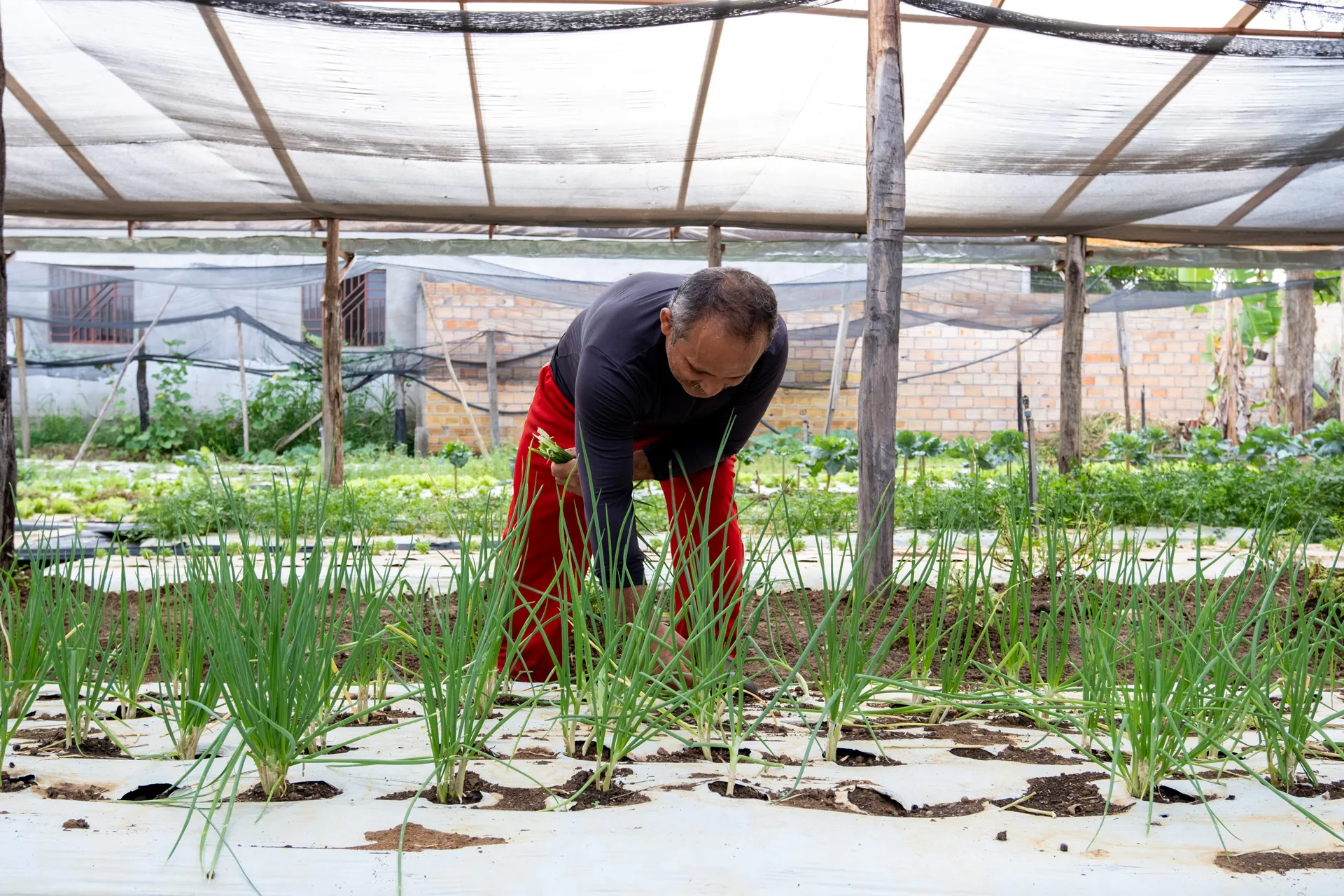
Sebastião Gomes picking green onions to be sold in bundles with parsley, a top-selling combo for organic vegetable producers. Photo: Soll/SUMAÚMA
It has been a steady learning process for Sebastião. The state rural extension agency, faculty at the Federal University of Pará, and other collaborators have all helped out. His garden is lush and healthy, and he says he doesn’t understand why people use pesticides. “The government says over and over again: let’s protect the environment. Then some big farmer comes along and spreads all these pesticides, killing off fish, polluting the rivers. So why talk about protecting the environment? If they open the gates…”
In 2023, the Brazilian Senate passed new pesticide legislation that makes it easier to apply this type of poison. Under the latest law, substances that can cause cancer or deformations, mutations, hormonal disorders, and other maladies are no longer specified as unacceptable in the composition of pesticides. It’s as if the new law said: we recognize the risks but also have confidence in safety practices and the correct application of these substances, with suitable techniques employed to reduce impacts. As if these techniques were always enforced. Reality says otherwise.
Farmers feel the effects of pesticides on their health
From 2019 to 2021, the municipality of Altamira led Brazil in deforestation, according to the website MapBiomas. Predatory exploitation of the rainforest has intensified since construction of the Trans-Amazonian Highway in the 1970s, propelling the biome to the point of no return—the moment when so much of the forest has been destroyed that it can no longer produce rain and keep the climate humid, the moment when it ceases to be home to thousands of species of plants, animals, fungi, and microorganisms.
If you drive down the highway at the height of the Amazonian summer, from July to September, you’ll pass kilometer after kilometer of dry grassland, with a smattering of rainforest fragments here and there. It was Brazil’s hottest September in 63 years, and Altamira was no different: according to data from the country’s national meteorology agency INMET, the city recorded an average temperature of 35o Celsius, or 95o Fahrenheit—11.2o C above the national historical average. Deforestation has worsened the natural phenomena of drought and pushed temperatures higher in the region. On top of this come the climate changes associated with global heating, all of which threatens the Amazon landscape and the lives of its local residents.
In southwestern Pará, the rainforest is no longer the same. Farmers, Beiradeiros, and Indigenous peoples grapple with prolonged droughts every year. With the advance of agribusiness, woodland areas have given way to monocultures of grass, soy, and corn, while tons of pesticides have been dumped into the environment. According to Brazil’s environmental protection agency Ibama, Pará has expanded its use of pesticides every year. Brazil is a world leader in the application of these poisons per cropland area, due to its climate, which makes it possible to plant more than one crop a year. In 2021 the country ranked number one, according to a survey by the Food and Agriculture Organization of the United Nations.
In the rural area of Vitória do Xingu, a municipality lying near the Belo Monte dam and about 60 kilometers from Altamira, SUMAÚMA spotted a young man on a farm applying pesticides without wearing any safety gear and a woman, likewise without any protective equipment, using poison in her backyard to kill the weeds—while children played nearby. Large-scale planting of soybeans and corn has also exacerbated the pesticide situation. Açai groves in the region of Volta Grande do Xingu have been poisoned, leaving a landscape of withered trees, dried out by toxic substances. Ten establishments, including two warehouses, have been licensed to sell pesticides in the municipality of Altamira. Half of them are in Castelo dos Sonhos, a district of Altamira located 970 kilometers from the city, almost on the border with Mato Grosso.
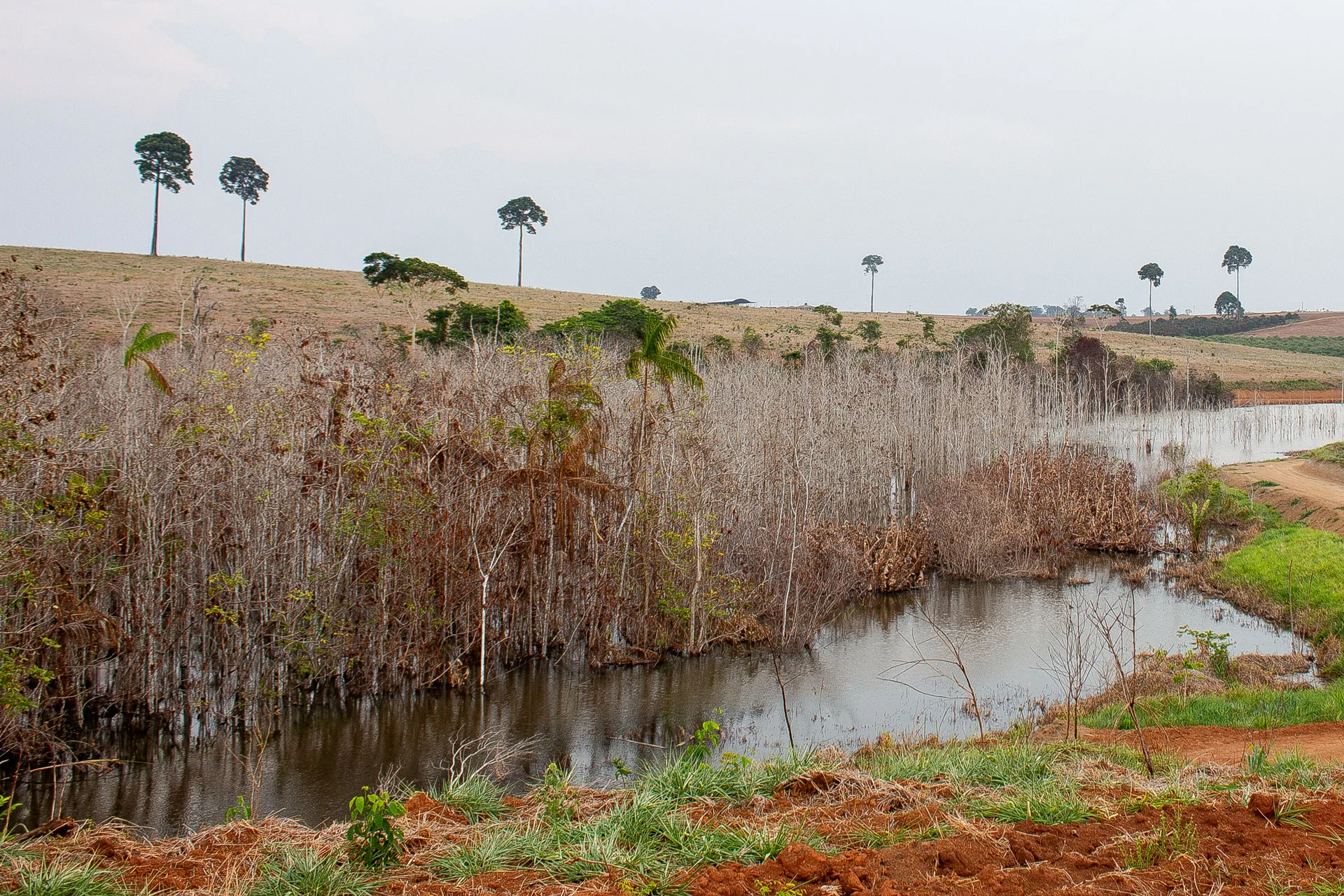
Grove of açai palm trees killed by the pesticides applied on a nearby grain farm. Photo: Soll
SUMAÚMA sent emails to both the main offices of the Pará State Agricultural Defense Agency in Belém and to the branch office in Altamira, asking about the use of pesticides in the region and the proper disposal of packaging; however, no reply was received. Since the agency website provides no information on properties that are licensed to apply these poisons, we sent the agency emails and WhatsApp messages inquiring about the matter, again without reply. We contacted the Altamira and Trans-Amazonian Association for the Marketing of Agricultural Products, a regional collection point for chemical product containers, and asked how many containers they had received since their opening in 2023, but we didn’t hear back. The facility has the capacity to handle 80 metric tons of containers per year.
According to information available on the website of the Pará State Agricultural Defense Department, the latest pesticide inspections took place in the region of Belém. When contacted, the agency did not provide any information on the number of inspections conducted in Altamira. We also requested the data by email but received no reply.
The National Pesticide Reduction Program proposes a gradual transition away from the application of poison to crops. But for the past ten years, the program’s implementation efforts have been stymied. Meanwhile, the pesticide industry and commodity producers (large-scale crops for export) have exerted direct influence over policymaking in the realm of new pesticide legislation.
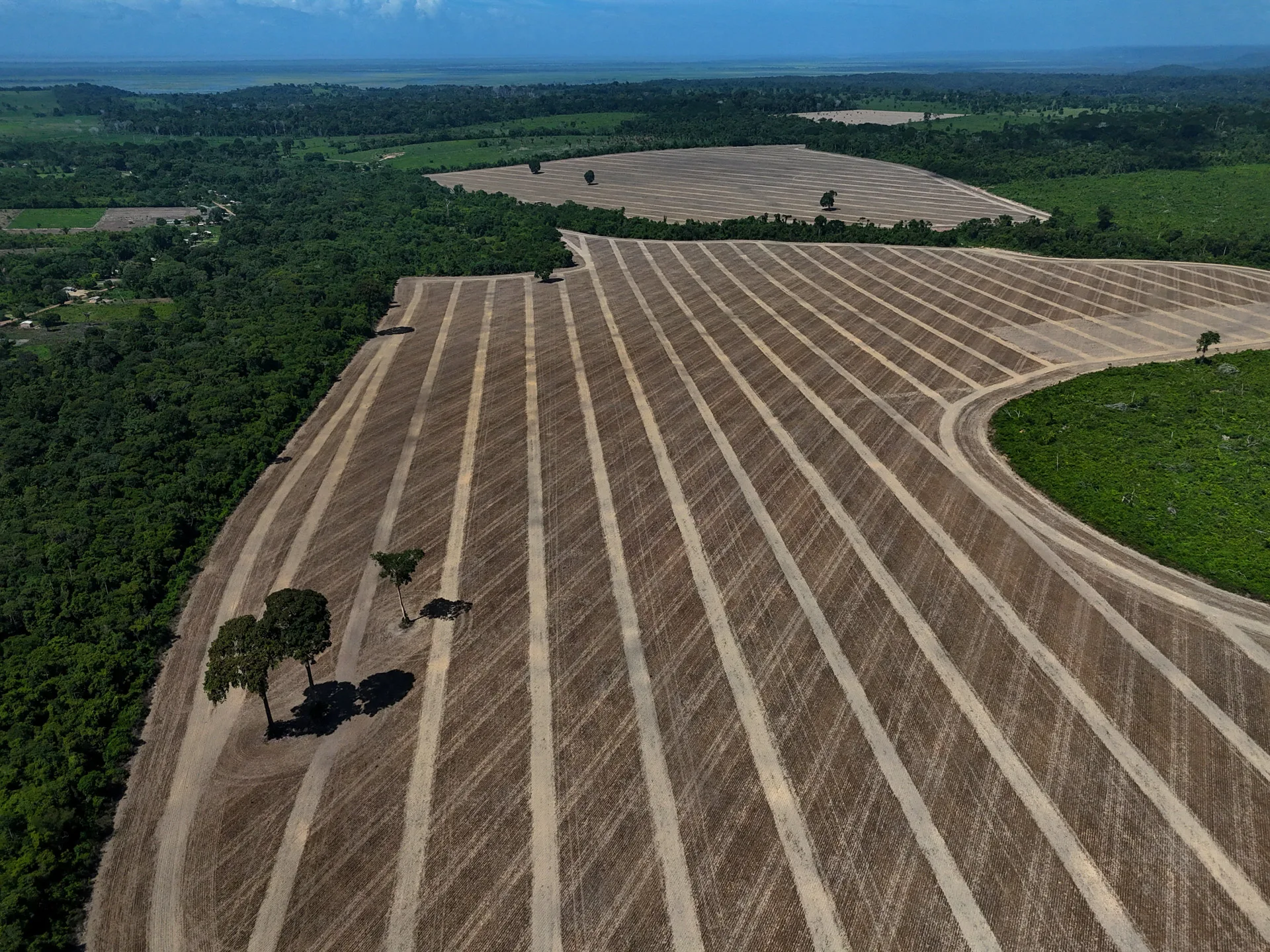
Forest cleared for soybean fields near Santarém, Pará. With the help of the federal government, the agribusiness sector plans to build the Ferrogrão, a mega-railway tailored to serve soy and corn producers. Photo: Michael Dantas/SUMAÚMA
Climate change forces production methods to change
Joabe dos Santos, the agronomist with Pará’s rural extension program who suggested Sebastião shift to organic produce, works on development projects in the field and offers farmers guidance. Joabe has followed the lives of the region’s planters for over 18 years and is well aware of the impact of recent climate extremes. Many tributaries now dry up in the summer and, with less rainfall, producers are forced to invest in irrigation equipment. The agent worries about producer access to water supplies, since not everyone can afford to dig an artesian well. “Where are they getting their water from? How long will the water last? In addition to water for irrigation, will these farmers have drinkable water for their families and animals? Not always,” he says. Without water, many of them end up selling their land and moving to town, where they experience social vulnerability.
In 2014, a study by the Pará rural extension agency found that there are no officially registered producers of organic vegetables in Altamira. It was around then that work on the Belo Monte hydroplant ignited a population explosion in the city and fueled demand for food. Planters ended up resorting to pesticides and other chemicals to boost their harvest. The same agency survey also showed that farmers had low educational levels and were unaware of how pesticides can jeopardize health. “What they want to do is produce as fast as possible, produce early, wherever the seed comes from, whatever product they’re going to use, in order to guarantee a market,” says Joabe.
Part of Joabe’s role as an extension agent is to advise on techniques that maximize soil use and crop production without damaging the environment. These are among the basic principles of agroecology, which focuses on environmental protection and a concern for people who live off the land. “Agroecology isn’t only about being concerned with crop production. First you have to worry about the environment,” the rural extension agent says.
These techniques have reshaped Sebastião’s life as an urban farmer. He knows his work “sides with Nature,” as he puts it. But every day demands a great deal of effort on his part, given how little assistance he receives and the few, if any, incentives. “Some days I think I’m not going to make it. I get physically tired, but I still have to go into the fields.”
Despite his fatigue, Sebastião keeps his spirits high. He knows his customers by name and also knows what they like to buy. “Hi there, Edson, good morning!” Sebastião greets his waiting client before even getting off his bike. Edson is an anthropologist who moved from the state of Paraíba to Altamira in 2019. He met Sebastião at a farmer’s market organized by the city two years ago and has been his client ever since.
Edson worries about how poisons like glyphosate might affect his health and so he tries his best to avoid foods sprayed with pesticides. He once lived in Mato Grosso, where he was eye-witness to “clouds of poison rain” pouring down on crops there. He stopped consuming soybean and corn oils, because ever since he saw chemical crop spraying, he’s been afraid of contamination: “It’s impossible for the oil to be completely clean, right?”
While at work, Sebastião always wears a leather hat and Ray-Ban sunglasses to shield his light-colored eyes from the fierce sun. Every part of his small business passes is in his hands: the preparation of fertilizer, planting, harvesting, sales, and even delivery of his produce, which he transports from house to house on a cargo bicycle. But he still needs to get his official certificate as an organic producer. To do so, he can rely on the support of the Pará state rural extension agency.
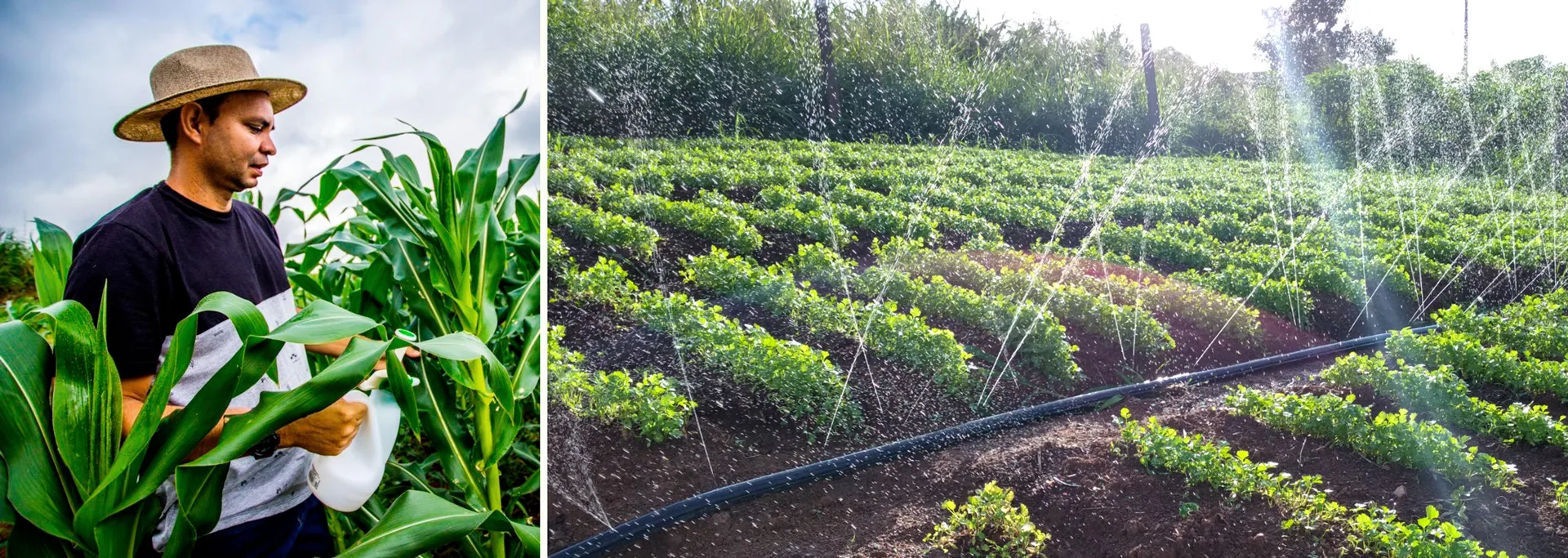
At a producer’s vegetable garden near Altamira, extension agent Joabe dos Santos shares advice on how to grow produce while respecting the environment. Photos: Personal archives
Lately, Sebastião has run into an additional challenge: the heat, which dries out the soil, kills plants, and makes it harder just to move around. “When I go outside, I have to rush, because on a hot, sunny day, by the time I get to the nursery, everything’s dying.” With the guidance of the Pará state agency, Sebastião has purchased sunblock screens that cut UV rays by 30% to 50%. The screens provide thermal comfort so his produce can thrive. In the past, he didn’t need an irrigation system, but climate change means producers have to devise new land management methods.
Another problem for farmers is that high temperatures and low relative humidity in the summer encourage the proliferation of pests and disease. One moment it’s hot, then it cools off after midnight, in the morning it starts heating up again, and these temperature swings favor mealybugs and other plant diseases, according to Joabe.
Climate change also worries Jader Adrian, a farmer and president of the Trans-Amazonian and Xingu Central Cooperative for Organic Production in Altamira. Founded in 2014, the co-op is a marketing center that receives organic cacao from four cooperatives located in the Pará municipalities of Pacajá, Vitória do Xingu, Brasil Novo, and Uruará. Harvests from small fields of organic cacao, which account for only 2% of state production, are now declining.
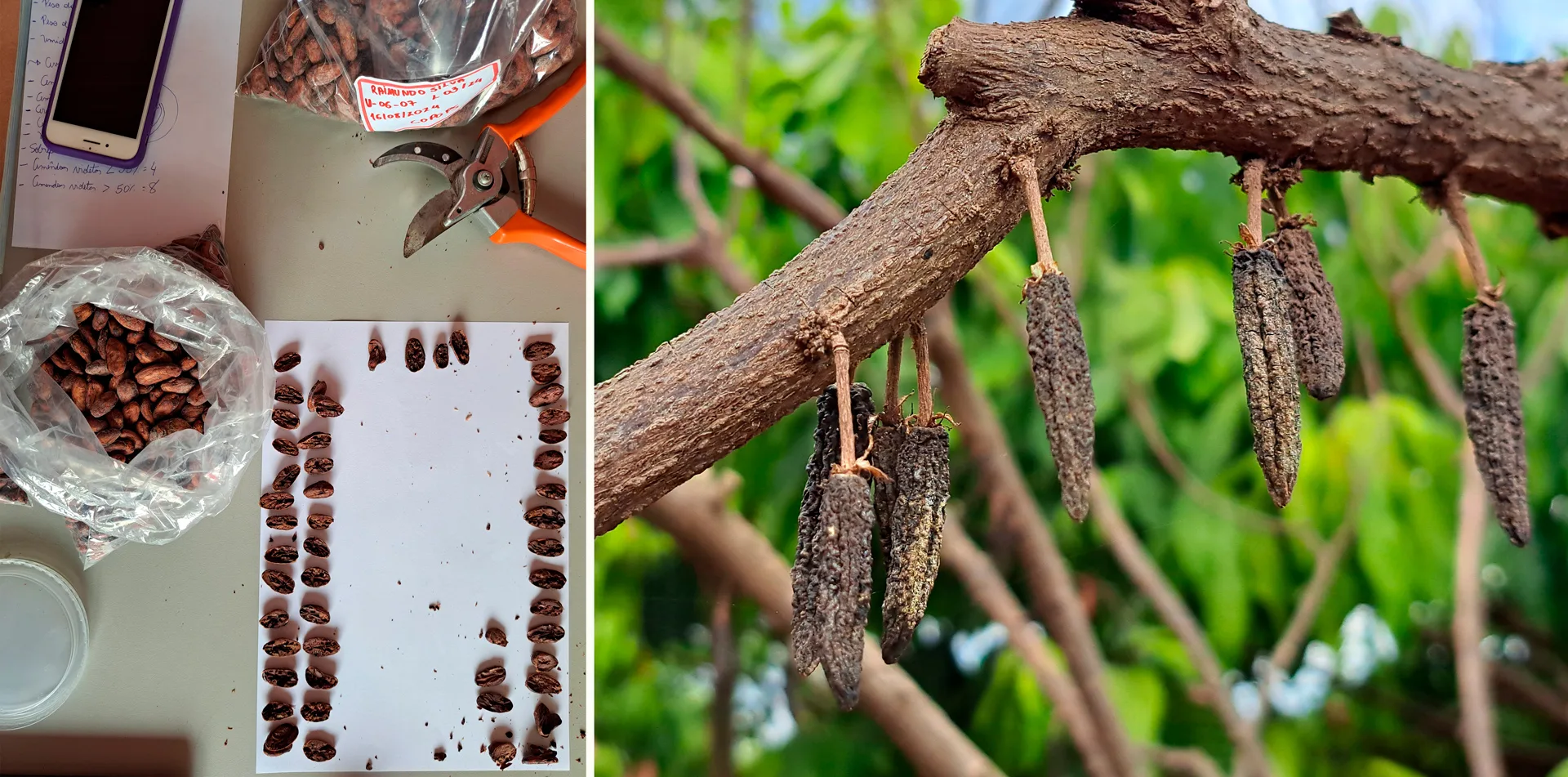
Analyzing organic cocoa beans; on the right, a dry cacao tree in the garden at the Trans-Amazonian and Xingu Central Cooperative for Organic Production. Photos: Juliana Bastos/SUMAÚMA
Following two years of drought, it is estimated that co-op production dropped 35% to 40% in 2024. The precise effects of this year’s drought will only be known in the 2025 harvest, but the damage is already starting to show. “Crops in our region are really suffering; lots of them are dying.” Now Jader is looking for partners to help invest in irrigation for the cooperatives’ cacao fields.
Climate change is having a huge impact, according to Jader, “much greater than we thought.” With longer summers and shorter periods of rain, plant roots barely have time to recover. They can’t cope with new stretches of drought and intense heat. Things are even touchier in organic cacao groves, where not just any type of fertilizer can be used. It becomes even more difficult to nourish the plants in the winter, so they can resist the strong summer sun. And this increases investment costs for farmers. “Our fields weren’t planned for irrigation. They were planted so we could produce in tune with our region’s climate,” he explains.
The agronomist Maysa Medeiros, professor at Serra Dourada College in Altamira, often buys Cacao Xingu chocolate, made from organic cacao produced by the farmer Jiovana Lunelli, near the 48-kilometer marker of the Trans-Amazonian. On Jiovana’s land, cacao trees are planted in the shade of gigantic Amazon trees teeming with majestic Scarlet Macaws. For Professor Maysa, this is yet another reason to support organic producers, who value family farming, use natural resources responsibly, and avoid the application of pesticides that are harmful to Nature and human health. “It’s a way we can strengthen the local economy and also encourage the preservation of forest areas,” she says.
Small businesses depend on the standing forest
Even where the forest hasn’t been as hard hit, farmers are feeling the impacts of climate change. Raimunda Rodrigues was born and raised on the Iriri River Extractive Reserve, where she still lives. Her parents were born on the Rio Novo tributary and are the founders of the Rio Novo mini-processing plant. Originally built to extract oil from babassu, the plant has also begun producing babassu flour and has now turned to processing Brazil nuts.
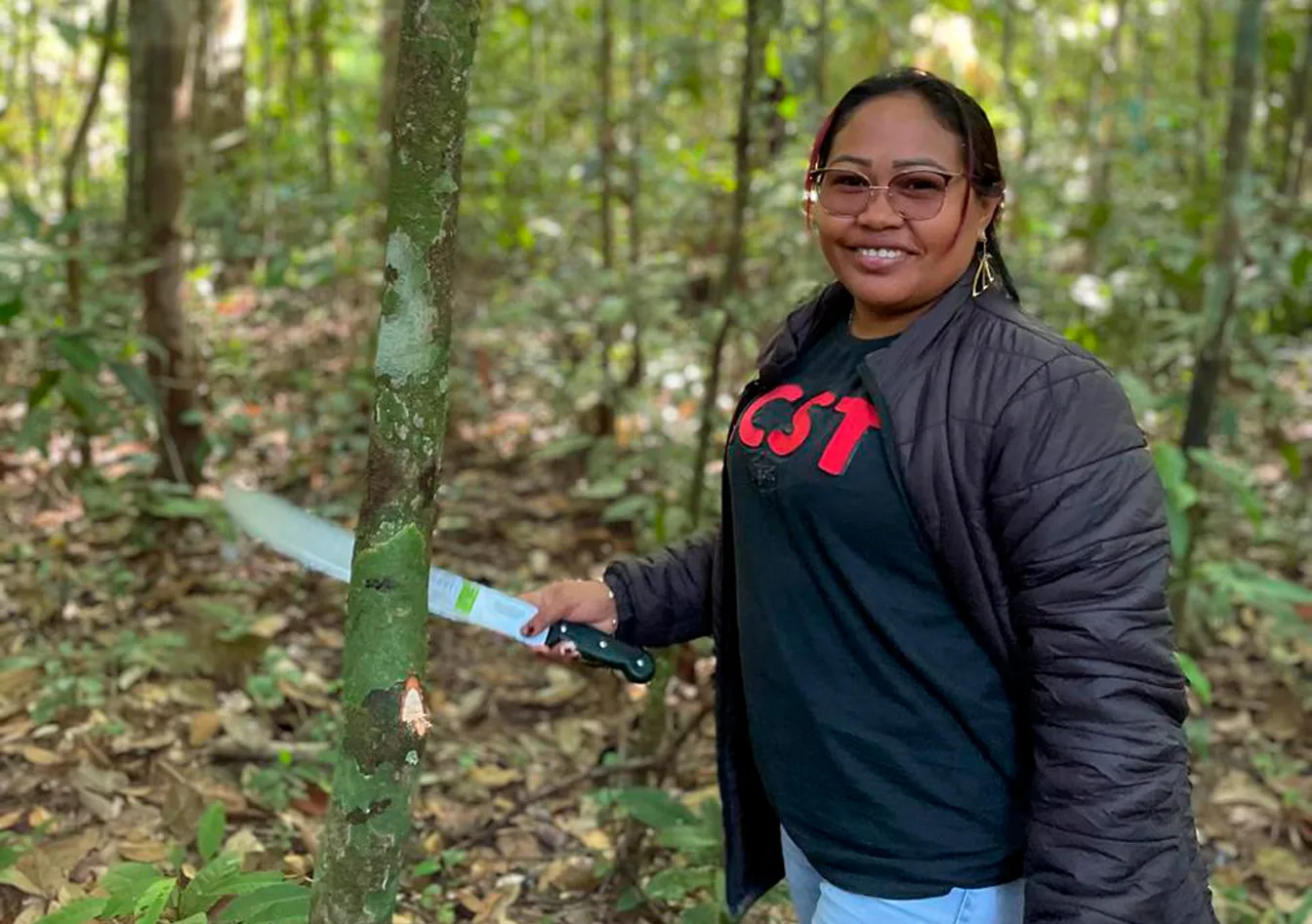
Raimunda Rodrigues and the machete she uses when gathering Brazil nuts. Raimunda is a leader in the fight to guarantee the survival of both nut groves and extractive producers. Photo: personal archives
Terra do Meio, or Middle Earth—a mosaic of conservation units that includes the Iriri Extractive Reserve—is home to eight such mini-processing plants with ties to extractive communities and Indigenous territories. The plants process forest fruit like golosa and mamuí, which are dehydrated and sold; Brazil nuts; babassu, from which flour and oil are extracted; and propagated fruit, like pineapples and bananas.
These small plants sell both raw and processed products to the canteens that are scattered across the communities and serve as both warehouses and points of sale. The canteens and processing plants follow Nature’s schedule: canteen owners purchase forest products every harvest and pay the extractivist Beiradeiros a fair price, set by the associations.
Raimunda believes the products she gathers from the rainforest are organic. “We don’t use any fertilizer, or anything, and what we get is fruit grown from the forest’s own fertilizer, at Nature’s pace.” In the case of banana, cassava, and cacao crops, traditional ways of planting are preserved, and no poison is used. “The cacao we plant here is organic. Its fertilizer comes from leaves and gourds; nothing else has ever been used.”
In addition to managing the mini-plant in Rio Novo, Raimunda is also the co-founder, along with two partners, of Mazô Maná, a company that makes natural shakes from fruit and seeds, sold in powder form in small packets. Thanks to a partnership between the company and the plant, new techniques have been designed to diversify the processing of forest products and reach a new clientele for the shakes. All of this generates more income for those living on the Extractive Reserve while likewise protecting the territory.
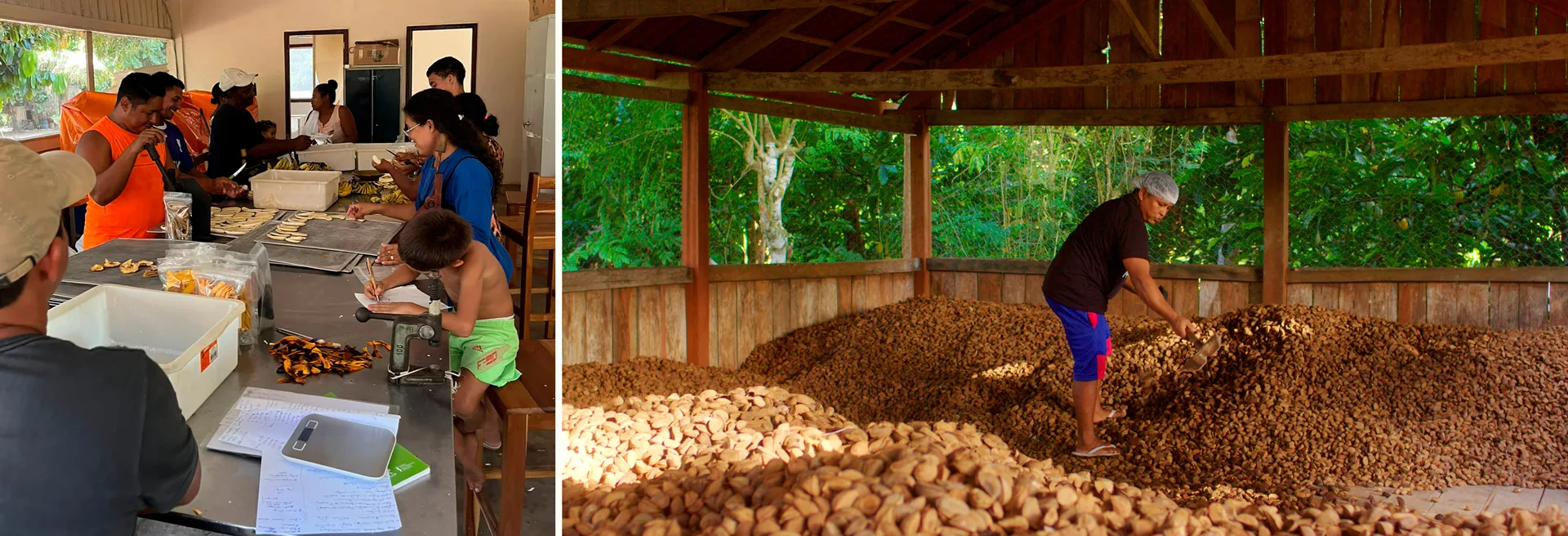
Processing fruit at a mini-plant; Marlon Rodrigues keeps a close eye on Brazil nuts drying in a shed. Photos: Larissa Rodrigues & Isa Brant/Mazô
The mini-plants have revived traces of the food culture typical of traditional peoples. Raimunda remembers when her community began using products from outside, like canned goods and cookies. At the time, she knew nothing about the babassu flour that had nourished her mother in childhood and is now produced by the plant. Under a contract with the Pará state government’s food purchasing program, the canteens now receive funds so they can buy food for the community school lunch programs directly from extractivist Beiradeiros, from fish to fruit. In Terra do Meio, the network of mini-plants and canteens offers an enduring option for making a living, allowing many locals to abandon illegal mining and logging.
Selma Bezerra de Castro lives on the Riozinho do Anfrísio Extractive Reserve, in Terra do Meio, and works for the Morro Verde Municipal School lunch program. She says it’s a pleasure to make the children food sourced from the rainforest, based on recipes and traditions she learned from her parents and grandparents. The other day, she surprised the students by serving them a cassava cake decorated with a sculpture of a frog, made from babassu flour. She also makes tapioca cake, cassava, yams, and sweet potatoes.
But it wasn’t always like this. When food products for the school lunches came only from the city, the variety was limited, and Selma found the food items strange. “They sent us some crackers that hurt your mouth, and the students complained: ‘Where’s the tapioca? Where’s the potatoes? Where’s the yams?’”
Selma says today’s students appreciate the rainforest food that is part of their lunch. But some foods are still brought in from the city, and the school cook thinks they need to cut back on the amount of cookies and hot dogs on the menu. Many of these products end up not being used for lunch and are instead donated to the community at the end of the school day. Selma thinks that before the agencies in charge decide what to send schools on the reserves, they should listen to the Beiradeiros themselves. A singer and songwriter, she recalled one of her songs: “It’s good to remember how many we are, planting seeds, feeding people. It’s good to remember we’re Beiradeiros and have the right to honor our traditions.”

School children enjoy a healthy lunch thanks to fresh fish, rice and beans, and fruit grown by Ribeirinhos. Photos: Amoreri archives
Selma’s music aside, Raimunda knows the Beiradeiros aren’t always heard. She often talks to the people living on the reserve about the value of keeping the forest standing and how it can earn revenue for the community. “That’s the difference I show them. If you sell this Brazil nut tree today for 300 reais [roughly $50], next year the tree won’t be here anymore,” she explains. Raimunda feels honored to do her job. In her community, she says the small processing plant benefits more than 40 people, 14 of whom are employees making monthly wages of over 2,000 reais [$330]. Raimunda is trying to expand the variety of processed products and open more mini-plants, because she believes this is a way of protecting the territories.
But for there to be growth, it’s important that the forest remains healthy. Lately, the extractivist reserve has been experiencing drier weather than usual, and every year Brazil’s nut crop has been trending downward. According to Raimunda, 2018 brought Rio Novo a record Brazil nut harvest, with 900 crates gathered. At the time, one kilo was going for roughly $11. In recent years, the harvest has averaged 200 crates, while the price per kilo has risen to $16.50. “But this year, you can’t get even 60 crates of nuts,” warns Raimunda. Everything has gotten harder.
In 2023, the country saw reduced cacao and Brazil nut harvests, and a further drop is expected. Extractive producers believe their crops will face mounting risks. Trees need rain to hold their flowers and seeds, but in the summer of 2024 it only rained twice on the Iriri Extractive Reserve. When the producers went to the nut groves to survey the damage done during the harsh summer, they noticed few seedlings had survived.
Because of the hotter weather, Beiradeiros have changed their daily work schedules too. “Folks who work in the fields can’t stand going from 7 am to 11:30 am or 12 o’clock anymore, because the sun has gotten so hot,” says Raimunda. People leave for work at 6 am and try to get back home by 10 am, “because the sun is scalding.” The gatherers have to travel up river and pay for fuel and labor to collect Brazil nuts. As harvests dwindle, those who do the work “can barely pay the bills and might even end up owing for next year,” says Raimunda.
Organic farming is seeing gradual growth in Brazil. In 2020, sales of these products grew 30%, according to a study by the Federal University of Rio Grande do Sul and Federal Technological University of Paraná. Part of this growth is due to the work of people like Raimunda, Jader, and Sebastião, who, certified or not, dirty their hands to produce healthy food while respecting local communities’ traditional knowledge and Nature’s schedule, without using poison or killing the forest. Despite all the challenges, Sebastião guarantees he will continue foregoing pesticides, instead remaining true to his motto: “Dirty hands, clean money.”
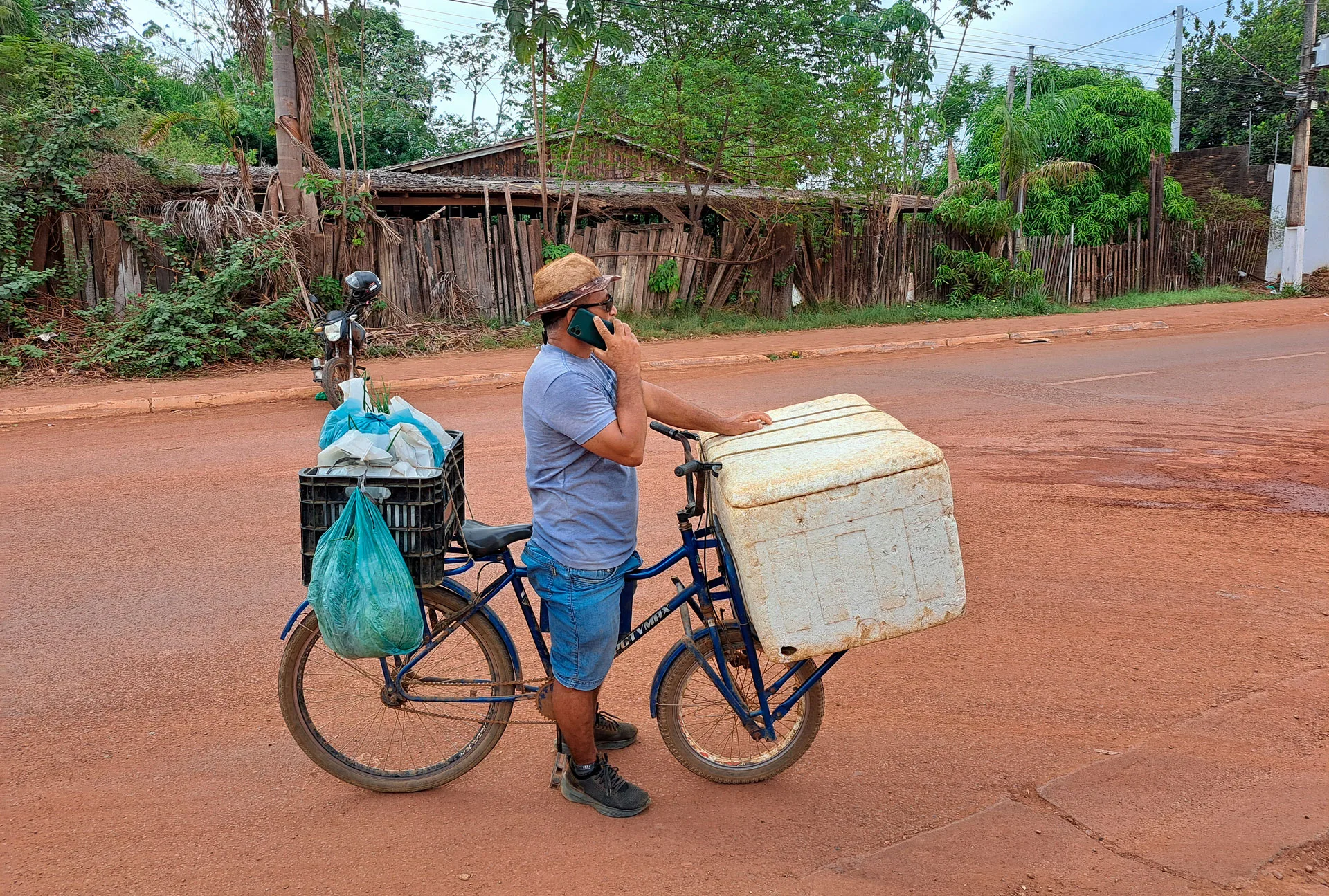
Sebastião on his bike, delivering produce, such as organic kale. Photo: Juliana Bastos/SUMAÚMA & InfoAmazonia
Report and text: Juliana Bastos
Editing: Fernanda da Escóssia
Photo Editor: Lela Beltrão
Fact-checker: Douglas Maia
Proofreader (Portuguese): Valquíria Della Pozza
Spanish translation: Meritxell Almarza
English translation: Diane Whitty
Copyediting and finishing: Natália Chagas
Editorial workflow: Viviane Zandonadi
Editor-in-chief: Talita Bedinelli
Editorial director: Eliane Brum





